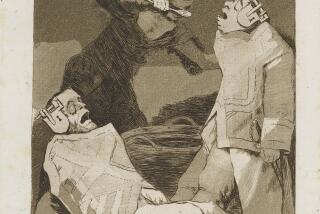SPECIAL SCREENING : ‘Mon Amour’: A Mix of the Beautiful and Wrenching
- Share via
Watching the TV interviews coming out of Oklahoma City, it’s clear once again that we can intellectualize tragedy but not fully explain our feelings. Survivors and those who knew the victims pause then just stop talking when the emotions rise up.
French filmmaker Alain Resnais had a similar reaction in the late ‘50s when he began a documentary on Hiroshima. Understanding the pain of such an event, Resnais decided, was impossible. His goal shifted from a realistic retelling of the atomic aftermath to a fictional account of our inability to assimilate it.
Using Marguerite Duras’ cerebral and vividly symbolic screenplay for a foundation, Resnais made “Hiroshima, Mon Amour,” a celebrated movie spotlighted Friday in the new Huntington Beach Art Center’s untitled weekly video and film series.
As Duras said, and Resnais agreed, the 1960 release is about our “search for oblivion” when confronted by Hiroshima (or the Holocaust, or Oklahoma City). The picture, set in 1950 Japan, is essentially pessimistic, but truthful in conceding our failure when trying to handle more than we can and the frustration that comes from that.
Sex, of all things, becomes a metaphor of that struggle as the film pivots on an affair between a French woman (Emmanuelle Riva) and a Japanese man (Eiji Okada).
The couple (who only call each other by their hometowns; she’s Nevers, he’s Hiroshima) interrupt their lovemaking for her to say she has seen the newsreels, been to the city and understands the depths of what happened in Hiroshima.
But he calmly insists that she really knows nothing. The force of Resnais’ vision tells us he’s right.
Their passion becomes an escape from both the awareness of the ruined city and their troubled lives away from the bedroom. The oblivion Duras emphasized is found in the primal eroticism of their relationship.
But they also know that this freedom is fleeting. Soon, it will be back to the real world where, eventually, both will forget the details of their time together.
Throughout their affair--which includes time-shifting flashbacks that help define the characters while creating an artful dreaminess--Resnais incorporates staged scenes of Hiroshima and archival footage just after the destruction.
The cumulative effect of combining history and make-believe suggests both distance and intimacy, which goes right to the heart of the film’s original point.
Technically, “Hiroshima, Mon Amour” is a mix of the beautiful and wrenching.
The opening scene is a fine example. At first, we see bodies in what appears to be an agonized embrace, apparently covered by the dust from the explosion. But a few camera dissolves later we realize that we’re seeing a pair of lovers, enjoying a more natural and comforting union. The irony is powerful.
Besides this unusual movie, Friday’s program (titled “Love, War . . . Whatever”) also offers Leonard Henny’s “Schizophrenia of Working for War.”
The 27-minute short shows the dilemma faced by a group of engineers who, although pacifists, made weapons during the Vietnam War.
*
What: Alain Resnais’ “Hiroshima, Mon Amour.”
When: Friday at 7 p.m.
Where: Huntington Beach Art Center, 538 Main St., Huntington Beach.
Whereabouts: Take Pacific Coast Highway to Main Street and head north.
Wherewithal: $6 general and $5 for museum members.
Where to call: (714) 374-1650.
(BEGIN TEXT OF INFOBOX / INFOGRAPHIC)
MORE SPECIAL SCREENINGS War Requiem
(NR) To commemorate the 50th anniversary of the end of World War II, the Master Chorale of Orange County will perform Benjamin Britten’s “War Requiem” at a screening of the Derek Jarman film by the same name on Saturday at 8 p.m. at the Orange County Performing Arts Center, 600 Town Center Drive, Costa Mesa. Concert preview at 7 p.m. $15 to $40. (714) 556-2787.
Bagdad Cafe
(PG) A Bavarian housewife gets into a fight with her husband and is left stranded in a California desert, where she becomes friends with a group of individuals in the town of Bagdad. Shows are May 26 at 7 and 9 p.m. at UC Irvine’s Crystal Cove Auditorium. Sponsored by the UCI Film Society. $4 for general admission, $3 for non-UCI students and seniors and $2 for UCI students. (714) 824-5588.
Tampopo
(NR) A 1986 Japanese comedy about a man, Goro, who goes into a struggling noodle shop, becomes close with the owner, Tampopo, and eventually turns her company into a thriving business. The movie takes many different angles, but the main focus is the bond between Goro and Tampopo. In Japanese, with English subtitles. Screens May 31 at 7 p.m. at UC Irvine’s Crystal Cove Auditorium. Sponsored by the UCI Film Society. $4 for general admission, $3 for non-UCI students and seniors and $2 for UCI students. (714) 824-5588.
More to Read
Only good movies
Get the Indie Focus newsletter, Mark Olsen's weekly guide to the world of cinema.
You may occasionally receive promotional content from the Los Angeles Times.










